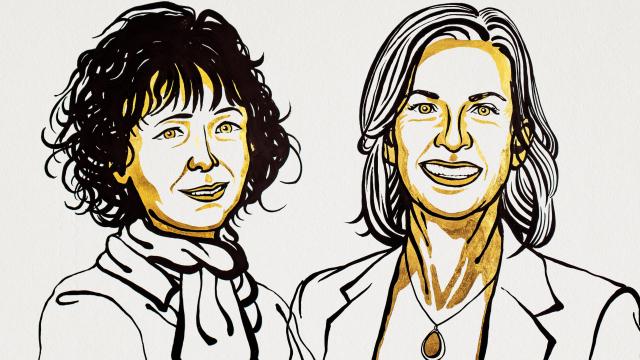On Wednesday, the Royal Swedish Academy of Sciences awarded the Nobel Prize in Chemistry to scientists Emmanuelle Charpentier and Jennifer Doudna for their pivotal roles in discovering CRISPR/Cas9, an ancient bacterial defence system that’s been adapted into a cheap and revolutionary gene-editing technology. This is the first Nobel in Chemistry to be shared exclusively by two women.
CRISPR is short for clustered regularly interspaced short palindromic repeats. It describes a system of genetic sequences found in bacteria and similar microorganisms. A CRISPR system is made from bits of repeating DNA as well as regularly spaced sections where other DNA sequences are fit into. In bacteria, these open spaces are filled with the genetic material of harmful viruses encountered in the past. This allows the bacteria to recognise the problem virus in the future, as well as to target the invader using enzymes (called Cas) that slice its genetic structure to ribbons. In short, CRISPR/Cas acts as a rudimentary and ancient immune system for bacteria.
The French-born Charpentier wasn’t the first to discover the existence of CRISPR/Cas. But in 2011, she and her team published research from their work with strep bacteria that revealed a never-before-seen aspect of CRISPR crucial to its function, called the tracrRNA molecule. This paved the way to Charpentier’s work with Doudna, then working at the University of California Berkeley, on one particular form of CRISPR: the CRISPR/Cas9 system.
Charpentier, Doudna, and their colleagues were the first to recreate CRISPR/Cas9 in the lab, outside of finding it naturally in bacteria. Even more importantly, they showed that it was possible to reprogram the system to target other pieces of DNA, not just those belonging to viruses. This simple finding meant that CRISPR/Cas9 could be turned into a pair of scissors used by scientists to edit the genes of most any living thing, with fewer resources needed than other gene-editing technologies available at the time. It’s fair to say that this discovery ushered in a new age of genetic engineering, with already tangible results in everything from agriculture to human cancer research.
“There is enormous power in this genetic tool, which affects us all. It has not only revolutionised basic science, but also resulted in innovative crops and will lead to ground-breaking new medical treatments,” said Claes Gustafsson, chair of the Nobel Committee for Chemistry, in a statement announcing the award.
Charpentier and Doudna were two of the scientists most involved in a fierce legal battle over the patents surrounding CRISPR/Cas9, facing off primarily against scientists from MIT’s Broad Institute. To make a very long story short, Charpentier and Doudna had filed for patents in early 2012 recognising them as the creators of the technology that allowed it to be adapted into a gene-editing tool; however, the Broad Institute filed patents six months later that sought credit instead, since their work was the first to show CRISPR could be applied to human cells. Ultimately, the patent office largely sided with the Broad Institute, though some patents were later given to Charpentier and Doudna’s team, and there are still disputes over the intellectual property of the technology left to be settled.
Many of the scientists involved in early CRISPR research, including Doudna, have since gone on to found companies invested in using CRISPR to pilot new treatments and applications. There are ongoing clinical trials involving its use as a treatment for cancer and sickle cell disease, while it’s already been used to improve the health and disease resistance of certain crops. Others are working on ways to refine CRISPR to become even more precise.
But there have also been thorny ethical questions about its use, especially when it was discovered in late 2018 that Chinese scientist He Jiankui had genetically modified at least three babies with CRISPR in an effort to make them resistant to HIV. The Chinese government eventually sentenced He Jiankui to three years in prison for his experiments, while it remains uncertain whether the children are truly resistant to the virus or free of any unexpected consequences from the genetic alterations.
This Nobel Prize is likely to enshrine Charpentier and Doudna as the foremost pioneers of the CRISPR technology.
